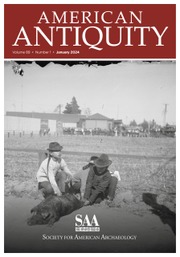Article contents
The Eastern Archaic: Some Problems and Hypotheses
Published online by Cambridge University Press: 20 January 2017
Extract
Unraveling an archaeological problem has often been compared to the solution of a crime, differing from the latter in the coldness of the trail. The “whodunit” detective approaches omniscience; the archaeologist can only hope for a small degree of information about the material clues to his case. It might be more apt to compare the archaeologic process in the Northeast to an attempt to find out what went into the hash, for scraps of leftovers are all too frequently the only remains of many obliterated northeastern sites.
Information
- Type
- Research Article
- Information
- Copyright
- Copyright © The Society for American Archaeology 1959
References
page 244 note * The date of 2005 B.C. published by Byers and Hadlock (1955) and Hadlock and Byers (1956) was obtained by subtracting 1954 years (the determination was made in 1954) from 3959, a weighted average of 4150 and 3800, the results of two separate runs on the same sample. Crane's date (1956) published as 3975 B.P. is a simple arithmetic average. The date here quoted represents the Byers and Hadlock date adjusted by the subtraction of 1950 years in conformity with practice outlined in the Introduction.
- 9
- Cited by

